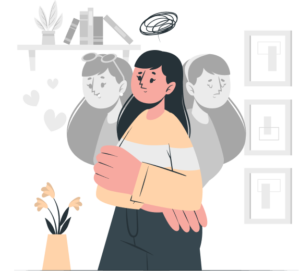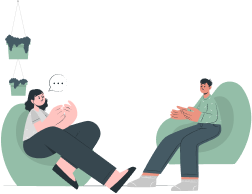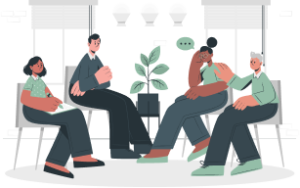Dialectical Behavior Therapy IN NYC and NC
What Is Dialectical Behavior Therapy?
 Dialectical Behavior Therapy, or DBT, is a highly effective treatment model for managing emotions and destructive behaviors. DBT often includes components of individual therapy, group skills training, and coaching—making it a time-limited, extensive, and highly effective treatment model for a wide range of mental health issues.
Dialectical Behavior Therapy, or DBT, is a highly effective treatment model for managing emotions and destructive behaviors. DBT often includes components of individual therapy, group skills training, and coaching—making it a time-limited, extensive, and highly effective treatment model for a wide range of mental health issues.
DBT was first developed by Dr. Marsha Linehan who sought to create a therapeutic approach that could help people identify their triggers and reduce unwanted reactions.
Since its inception in the 1980s, Dialectical Behavior Therapy has become one of the leading therapeutic approaches. There have been hundreds of studies validating the effectiveness of DBT, making it one of the most researched therapeutic modalities to date.
Today, DBT is used to help individuals manage stress, emotions, interpersonal challenges, impulsive behaviors, and low self-esteem. It is particularly effective for those struggling with Borderline Personality Disorder (BPD), bipolar disorder, and depression. In addition to self-harm, eating disorders, PTSD, ADHD, and substance abuse.
What Does Therapy Using DBT Look Like?
Dialectical Behavior Therapy includes multiple components and is time-limited in nature. A patient can expect to be in therapy for about 6 to 12 months with the goal of obtaining the four main critical skill sets of DBT.
With these skill sets in mind, patients undergo the process of Dialectical Behavior Therapy through three formats.
Mindfulness: the practice of being fully aware and present in this one moment
Distress Tolerance: how to tolerate pain in difficult situations
Interpersonal Effectiveness: how to ask for wants/needs and create boundaries while maintaining self-respect and relationships with others
Emotion Regulation: changing emotions that are no longer productive
1. Individual Therapy
 DBT uses individual therapy to facilitate emotional awareness and skills-building. Patients fill out diary cards for each session that monitor and assess their emotional reaction to triggering situations. The therapist then follows a step-by-step hierarchy to determine if stress responses are life-threatening, impacting treatment, or generally interfering with quality of life.
DBT uses individual therapy to facilitate emotional awareness and skills-building. Patients fill out diary cards for each session that monitor and assess their emotional reaction to triggering situations. The therapist then follows a step-by-step hierarchy to determine if stress responses are life-threatening, impacting treatment, or generally interfering with quality of life.
Using this information, the therapist will work with the patient to identify target behaviors. This may include things like depressive symptoms, substance abuse, and self-harm—that can be evaluated and ultimately reduced throughout treatment. The therapist will also encourage the patient to reflect on the activities, relationships, and experiences in their life that increase positive responses and outlook.
The patient will be able to identify and manage stress responses before they become problematic, contributing to a stronger sense of self-awareness and self-compassion.
2. Skills Training Class (Group Therapy)
 DBT skills group is a structured, class-like environment that uses practice exercises, skills-building, and group discussion to support treatment. By coming together to share their experience using skills and examples of success, DBT group therapy facilitates peer connection and support among individuals.
DBT skills group is a structured, class-like environment that uses practice exercises, skills-building, and group discussion to support treatment. By coming together to share their experience using skills and examples of success, DBT group therapy facilitates peer connection and support among individuals.
Though this can be a frightening or anxiety-inducing element of Dialectical Behavior Therapy, patients often enjoy the DBT skills training component the most and find it to be an essential part of their treatment. Moreover, patients can often generate insights in a group setting that they likely would not otherwise gain in individual sessions.
3. Phone Coaching
Coaching sessions are used in DBT to bolster the work being done in individual and group therapy. Therapists use coaching as an opportunity for a “check-in” between sessions to assess a patient’s use of their diary cards and stress responses.
Due to its highly involved nature, Dialectical Behavior Therapy is robust enough to support the individuals using it—even those who are struggling with severe behaviors, intense emotions, and impulses.
DBT At Kind Mind
At Kind Mind, DBT is considered the gold standard for treating patients with a wide array of conditions that result in emotional dysregulation. Our practice owner, Dr. Monica Johnson, has received extensive training in this method and has written a book about how to use DBT in managing racial trauma.
Because Dr. Johnson trains all of our clinicians, our team is likely to incorporate elements of Dialectical Behavior Therapy into treatment for depression, anxiety, and PTSD among other mental health concerns—even if DBT is not the main modality being used.
In addition, we are happy to implement any outside providers who may help support treatment and skills-building using DBT. That means we will work with patients who are already in individual therapy if they feel they could benefit from a skills training class at Kind Mind. For our current patients who struggle with emotional dysregulation or can’t seem to find relief through other treatment methods, we may recommend Dialectical Behavior Therapy.
You Can Manage Your Emotions And Stress Responses
If you struggle emotionally, have difficulty adjusting to your environment, or engage in behaviors that intensify your distress, Dialectical Behavior Therapy can greatly aid in your healing.
For more information about how we can help or to schedule an appointment with one of our DBT therapists, follow the steps below:
- Get in touch with us here.
- Learn more about DBT by exploring our blogs.
- Use DBT skills to build emotional awareness.
Other Services We Offer in New York and North Carolina
In addition to DBT therapy, we offer group therapy that creates a welcoming space where you can connect with others, share experiences, and feel empowered as part of a supportive community. For those within the LGBTQIA+ community, our LGBTQIA+ therapy is a compassionate and affirming space where you can explore your identity and celebrate who you are. We also offer couples therapy, helping partners strengthen their bond. If you’re seeking to heal from past trauma, our specialized EMDR therapy and Internal Family Systems (IFS) therapy are designed to guide you toward lasting healing and emotional resilience. Whatever you’re facing, we’re here to help you thrive.